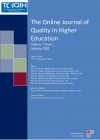TOJQIH - Volume 1 - Issue 1 - January 2014
 A FOUR-PILLAR DESIGN TO IMPROVE THE QUALITY OF STATISTICAL REASONING AND THINKING IN HIGHER EDUCATION
A FOUR-PILLAR DESIGN TO IMPROVE THE QUALITY OF STATISTICAL REASONING AND THINKING IN HIGHER EDUCATION Mehmet T├ā┬╝reg├ā┬╝n
Abstract: In this paper an investigation of the connections and tensions among the four pillars of, content, pedagogy, technology, and assessment is presented from a standpoint of building a structure that is conducive to developing quantitative reasoning and analysis skills among university students, and, possibly, faculty members.
 ACADEMIC QUALITY IMPROVEMENT PROGRAM (AQIP): A PEER REVIEWER├óŌé¼ŌäóS PERSPECTIVE
ACADEMIC QUALITY IMPROVEMENT PROGRAM (AQIP): A PEER REVIEWER├óŌé¼ŌäóS PERSPECTIVE Douglas Franklin
Abstract: The Higher Learning Commission is an accrediting commission of the North Central Association of Colleges and Schools, one of six regional accrediting agencies in the United States. The Academic Quality Improvement Program (AQIP) is an alternative to the traditional accreditation process and integrates the principles and processes of continuous improvement into the culture of colleges and universities. AQIP is grounded in the concept that systematic improvement is gained by using achievable action projects. Presented from the experience of a seasoned peer reviewer, the paper seeks inform readers of the AQIP process, identify Higher Learning Commission Criteria and AQIP Categories, and explore the principles of high performing organizations. The results of impromptu study of twenty-one AQIP projects found institutions often would benefit from establishing a more collaborative environment, engage in market research and assessment when developing and implementing projects, and utilize relevant research and professional standards as part of institutional quality assurance processes.
 ETHICS AND VALUES TOWARDS MANAGEMENT EDUCATION QUALITY: A GLOBAL SCENARIO├óŌé¼┬Ø
ETHICS AND VALUES TOWARDS MANAGEMENT EDUCATION QUALITY: A GLOBAL SCENARIO├óŌé¼┬Ø Asma Zaheer
Abstract: Global competition, emergence of consulting business and Internet based transactions are changing the product offerings in management education. The trends of evolution of management education indicate that knowledge creation is becoming more students based. This will usher in a variety of changes, including, paradoxically, a trend towards closer interaction among industry, students and faculty. The challenge is to ensure high quality management education that could financially sustain itself, but at the same time capable of generating a pool of leaders who could emerge as the real global business leaders. As manufacturing, research and services are getting relocated, executives need to develop a global outlook and business schools have to reorient rapidly to meet this global business challenge. This paper outlined the basic ethics and values to improve the quality of management education as management education is an extraordinary model of a liberal education. It is steeped in intellectual traditions drawn from theories and concepts representing a wide range of social sciences including economics, sociology, psychology, mathematics, and statistics.
 QUALITATIVE ANALYSIS OF MULTIDISPLINARY COLLEGE STUDENTS IN AN INTERNATIONAL ALTERNATIVE
QUALITATIVE ANALYSIS OF MULTIDISPLINARY COLLEGE STUDENTS IN AN INTERNATIONAL ALTERNATIVE Sandra Sydnor, Margaret Shu-Mei Sass, Mope Adeola, Thelma Snuggs
Abstract: The purpose of this study is to evaluate the effectiveness of a multi-disciplinary international alternative break course involving service learning as part of the curriculum. Nursing, Consumer Science & Retailing, Hospitality and Tourism Management, and non HHS students integrated each discipline into a holistic service-learning course, successfully meeting simultaneous learning objectives in the Colombia study abroad course. Participants in the course wrote pre and post reflections, completed weekly journals and a final reflective presentation and research paper. The initiative was deemed a success on the basis of post metrics / discussions with host recipients and student travelers. Three themes emerged from the qualitative data which included (1) appreciation, (2) empathy, and (3) learning about self.
 WHY QUALITY MATTERS: STRATEGIES FOR DESIGNING QUALITY E-LEARNING ENVIRONMENTS
WHY QUALITY MATTERS: STRATEGIES FOR DESIGNING QUALITY E-LEARNING ENVIRONMENTS Teresa Franklin
Abstract: This paper examines the need to improve the quality of course development and delivery in online environments. The Quality Matters rubric will be discussed as an assessment framework for the connection between delivery and design using peer assessment to guide the development of quality online courses that are student-centered and support active learning and student engagement in the online environment. The Quality Matters rubric can be used to improve course design as well as engage faculty in a discussion concerning the quality of e-learning courses offered on a university campus.


